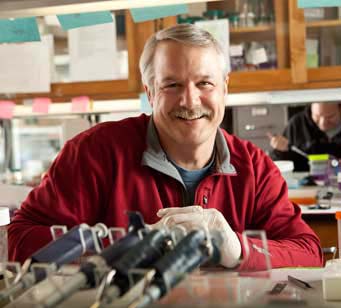Computational biology is a field that brings together elements of computer science and biology. It is where big data intersects with science and where much of biology can be described by mathematical equations. Computational biologists conduct bench research and develop tools to effectively analyze the huge volumes of data generated in researching genetics and genomics, including genetic mapping and DNA sequencing.
Dr. Keith Crandall, a renowned biologist and population geneticist, recently joined GW as the founding director of a new interdisciplinary Computational Biology Institute. The Institute, considered a major research priority by the University, will focus on large-scale integrative bioinformatics and genomics, and will be located at the GW Virginia Science and Technology Campus (VSTC) in Ashburn, Va.
“My work is centered on computational biology and evolutionary biology informatics,” Dr. Crandall explained. “We develop software and methodology and apply them in different areas, including crustacean biology and biodiversity. I also do a lot of work on infectious diseases and HIV.”
“This is the beginning of a true interdisciplinary initiative at George Washington that I expect will positively impact virtually all colleges and schools,” said Leo Chalupa, vice president of research at GW. “I believe that Dr. Crandall’s recruitment as the founding director of the Computational Biology Institute will be the driving force towards more cross-campus research in many fields including computer science, evolutionary biology and personalized medicine.”
The George Washington University is one of the first universities to establish an institute dedicated to computational biology. It will build upon existing partnerships with regional research centers of excellence, including Children’s National Medical Center, National Institute of Standards and Technology, HHMI’s Janelia Farm Research Campus, Inova Health System, Naval Research Laboratory, Virginia Tech-Arlington and the National Institutes of Health intramural research program.
As a recipient of more than $18 million in grant funding throughout his career, Dr. Crandall brings several significant projects with him to GW. As part of a $6 million, multi-institutional award from the Gulf of Mexico Research Initiative, Dr. Crandall will use gene expression analysis to identify how oil pollutants from the 2010 BP oil spill affect deep sea crustaceans.
He also serves as a lead investigator for the National Science Foundation Open Tree of Life project, which brings together researchers from 10 institutions to draft, for the first time, an online, comprehensive tree of all 1.8 million named species of fungus, plants and animals.
A prolific researcher, Dr. Crandall has published over 200 papers and 3 books. In 2010, he was designated a “Highly Cited” researcher, a distinction reserved for the top one-half of one percent of all publishing scholars. Dr. Crandall is among the 250 most-cited researchers in the category of “Ecology/Environment” rated by the ISI Web of Knowledge database. He has written 21 papers that have been cited more than 100 times each on subjects ranging from the evolution of HIV to the biogeography of Australian crayfish.
This summer Dr. Crandall received the Edward O. Wilson Naturalist Award for his natural history work on crustaceans and freshwater crayfish. The award, given by the American Society of Naturalists, is given to a researcher who has made significant contributions to the knowledge of a particular ecosystem or group of organisms.
“One could not imagine a better field to fit the research and educational profile of VSTC,” said Ali Eskandarian, dean of GW’s Virginia Science and Technology Campus. “The spirit of the campus embodies inter- and multi-disciplinary research that while cutting edge on the discovery front also has the potential for applications to the larger technological and scientific challenges of the society.”
Dr. Crandall comes to George Washington from Brigham Young University where he has served as a faculty member since 1996 and chair of the biology department since 2007. He is a recipient of the Alfred P. Sloan Young Investigator Award, the National Science Foundation Career Award, the National Institutes of Health James A. Shannon Director's Award and a Fulbright Scholar Award to Oxford University. He is past president of the Society of Systematic Biologists. Dr. Crandall earned a Ph.D. in population and evolutionary biology and a master’s degree in statistics, both from Washington University in St. Louis.
“I feel it is a great honor to join the George Washington University faculty and direct the new Computational Biology Institute,” Dr. Crandall said. “We have an amazing opportunity in this new genomics era to be world leaders in developing and implementing computational approaches to broad questions from biodiversity crisis issues to translational medicine. With the exceptional faculty and outstanding leadership at GW, the institute is sure to be a huge success. I can't wait to get started.”


